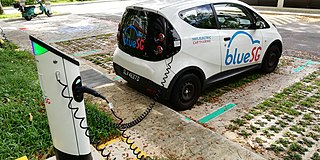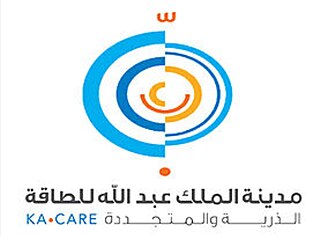
The energy policy of the United States is determined by federal, state, and local entities. It addresses issues of energy production, distribution, consumption, and modes of use, such as building codes, mileage standards, and commuting policies. Energy policy may be addressed via legislation, regulation, court decisions, public participation, and other techniques.

Clean technology, also called cleantech or climatetech, is any process, product, or service that reduces negative environmental impacts through significant energy efficiency improvements, the sustainable use of resources, or environmental protection activities. Clean technology includes a broad range of technology related to recycling, renewable energy, information technology, green transportation, electric motors, green chemistry, lighting, grey water, and more. Environmental finance is a method by which new clean technology projects can obtain financing through the generation of carbon credits. A project that is developed with concern for climate change mitigation is also known as a carbon project.

The Alliance to Save Energy is a bipartisan, nonprofit coalition of business, government, environmental, and consumer groups based in Washington, D.C. The Alliance states that it advocates for "energy-efficiency policies that minimize costs to society and individual consumers, and that lessen greenhouse gas emissions and their impact on the global climate." The Alliance's chief activities include public relations, research, and lobbying to change U.S. energy policy.

The Edison Electric Institute (EEI) is an association that represents all U.S. investor-owned electric companies.

The Renewable Energy and Energy Efficiency Partnership (REEEP) is a Vienna-based Quasi-International Organisation that advances markets for renewable energy and energy efficiency with a particular emphasis on the emerging markets and developing countries.

The energy policy of the European Union focuses on energy security, sustainability, and integrating the energy markets of member states. An increasingly important part of it is climate policy. A key energy policy adopted in 2009 is the 20/20/20 objectives, binding for all EU Member States. The target involved increasing the share of renewable energy in its final energy use to 20%, reduce greenhouse gases by 20% and increase energy efficiency by 20%. After this target was met, new targets for 2030 were set at a 55% reduction of greenhouse gas emissions by 2030 as part of the European Green Deal. After the Russian invasion of Ukraine, the EU's energy policy turned more towards energy security in their REPowerEU policy package, which boosts both renewable deployment and fossil fuel infrastructure for alternative suppliers.
Outlook on Renewable Energy in America is a comprehensive two-volume report, published in 2007 by the American Council on Renewable Energy (ACORE), about the future of renewable energy in the United States. It has been said that this report exposes a "new reality for renewable energy in America".
For solar power, South Asia has the ideal combination of both high solar insolation and a high density of potential customers.

According to data from the US Energy Information Administration, renewable energy accounted for 8.4% of total primary energy production and 21% of total utility-scale electricity generation in the United States in 2022.
The Climate Investment Funds (CIF) was established in 2008 as a multilateral climate fund in order to finance pilot projects in developing countries at the request of the G8 and G20. The CIF administers a collection of programs with a view to helping nations fight the impacts of climate change and accelerate their shift to a low-carbon economy. Through contributions from 14 donor countries, CIF supports more than 350 projects in 72 low and middle-income countries on the frontlines of the climate crisis.

The Energy Future Coalition is a nonpartisan public policy initiative that seeks to speed the transition to a new energy economy. The Coalition brings together business, labor, and environmental groups to identify new directions in energy policy with broad political support.

The BC Tech Association, formally the British Columbia Technology Industry Association (BCTIA), is a not-for-profit member-funded trade association in British Columbia, Canada, which promotes the technology industry in the province. The technology industry in BC has been growing steadily since the late 1990s and constituted 5.9% of British Columbia's economic output in 2007.
Singapore International Energy Week (SIEW), formerly called the International Energy Week, is an annual week-long energy conference comprising several exhibitions, workshops, and networking sessions focused on fundamental issues within the energy industry. Held since 2008, it is organized by the Energy Market Authority.

The Interstate Renewable Energy Council (IREC), established in 1982, is a non-profit organization working with clean energy. It is based in Latham, New York.
Energy use and development in Africa varies widely across the continent, with some African countries exporting energy to neighbors or the global market, while others lack even basic infrastructures or systems to acquire energy. The World Bank has declared 32 of the 48 nations on the continent to be in an energy crisis. Energy development has not kept pace with rising demand in developing regions, placing a large strain on the continent's existing resources over the first decade of the new century. From 2001 to 2005, GDP for over half of the countries in Sub Saharan Africa rose by over 4.5% annually, while generation capacity grew at a rate of 1.2%.

The King Abdullah City for Atomic and Renewable Energy (K.A.C.A.R.E.) is a scientific research and governmental entity in the Kingdom of Saudi Arabia and is chaired by the Minister of Energy. K.A.C.A.R.E. was founded in 2010 with a mandate to develop nuclear and renewable energy in Saudi Arabia. It is headquartered in Riyadh city.

An energy transition is a major structural change to energy supply and consumption in an energy system. Currently, a transition to sustainable energy is underway to limit climate change. As much sustainable energy is renewable it is also known as the renewable energy transition. The current transition aims to reduce greenhouse gas emissions from energy quickly and sustainably, mostly by phasing-down fossil fuels and changing as many processes as possible to operate on low carbon electricity. A previous energy transition perhaps took place during the Industrial Revolution from 1760 onwards, from wood and other biomass to coal, followed by oil and later natural gas.
Smart Grid Interoperability Panel or SGIP is an organization that defines requirements for a smarter electric grid by driving interoperability, the use of standard, and collaborating across organizations to address gaps and issue hindering the deployment of smart grid technologies.

The United States Energy Association (USEA) is an association of public and private energy-related organizations, corporations, nonprofits, educational institutions, think tanks and government agencies. USEA works with the U. S. Department of Energy, U.S. Department of State and the U.S. Agency for International Development (USAID) to make energy accessible throughout the world by focusing on the viability of electricity, coal, oil, gas, nuclear and renewables. The organization also serves as a resource for the domestic and global energy industry, hosting a variety of events year-round that inform on current energy policy, challenges and technologies. Through its member organizations, USEA shares energy best practices, executes projects, and coordinates research domestically and internationally.
Linux Foundation Energy is an initiative launched by the US-based Linux Foundation in 2018 to improve the power grid. Its aim is to spur the uptake of digital technologies within the electricity sector and adjoining sectors using open source software and practices, with a key application being the smarter grid.












